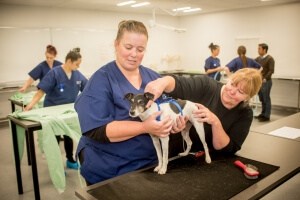EIT’s animal care and vet nursing students are enjoying the best of learning environments, with a purpose-designed facility opened on campus earlier this year.
Providing a training setting modelled along the lines of a real-life veterinary clinic, the new facility includes a full reception area, an animal room, diagnostics and prep room, kennels and cattery, scrub bay, surgery and isolation unit.
The building is three times the size of the former facility, which provided a reception area, animal room and small all-purpose practical teaching room.
Students “just love” the new learning centre and keep it pristine, says veterinary nursing programme coordinator Stephanie Thomas, just as they would be required to do when working at veterinary clinics.
They also have plenty of scope to work with animals housed on site – mice, guinea pigs, rats, rabbits, an axolotl, fish, turtles, a ring-necked parrot called TJ and chickens as well as pets brought into the facility by vet nursing and animal care staff.
EIT’s restructured and new programmes are another major plus for those wanting to study animal care and vet nursing in Hawke’s Bay.
This year, EIT launched the New Zealand Diploma in Veterinary Nursing, making it among the first educators in the country to offer both the Level 6 qualification and the Level 5 New Zealand Certificate in Animal Technology (Veterinary Nursing Assistant strand).
Qualifications for animal care and vet nursing have recently been changed nationwide, explains Stephanie. The move to further standardise training programmes was driven by the New Zealand Veterinary Nursing Association and the New Zealand Veterinary Association and was aimed at ensuring vet clinics knew what skill sets job applicants had when they took on staff.
In a further change for the industry, veterinary nurses are now able to become registered if they have gained the Level 6 diploma, worked the specified number of hours in a clinic and provided evidence of continuing professional development.
EIT consulted with veterinary clinics operating in Hawke’s Bay in reshaping its suite of programmes.
From next year, the Level 2 National Certificate in Animal Care is to be replaced with a new programme, offered at either Level 3 or 4.
“This programme is aimed at giving students the skills and knowledge to work in pet shops, catteries and kennels and for the SPCA,” says Stephanie.
All the programmes encompass work experience, ranging from one day a week for 14 weeks of the 18-week animal care programme to a total of seven weeks a year at clinics outside the region for diploma students.

